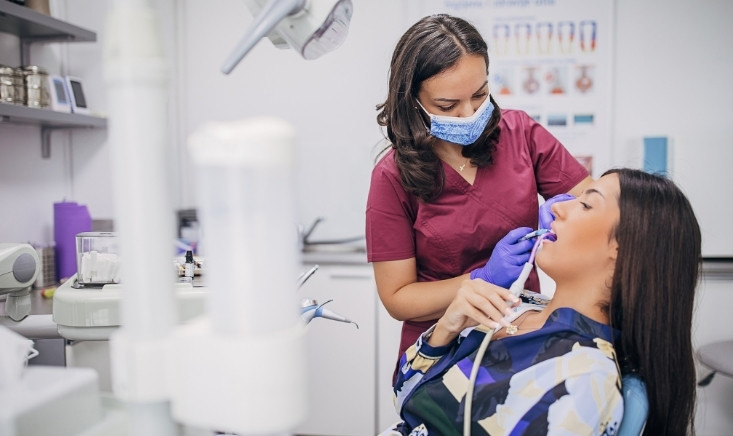Essential Steps for Handling a Dental Emergency in Addison

Dental emergencies can happen at any time. Whether it’s a sudden toothache, a broken tooth, or an injury to your gums, being prepared is crucial. Knowing what to do during a dental emergency can make all the difference in preventing further damage and reducing pain. In this blog, we’ll go over essential steps to take in case of a dental emergency so you know exactly what to do when the unexpected occurs.
Be Prepared in Case of a Dental Emergency: The Importance of a Plan
One of the most important things you can do is be prepared in case of a dental emergency. It’s easy to panic when an emergency strikes, but having a plan can make a stressful situation more manageable. Here’s how you can stay ready:
- Keep your dentist’s number handy: Store your dentist’s contact information in your phone or keep it in a place where everyone in your household can easily find it.
- Know when to call an emergency dentist: Some dental issues, like a broken tooth or severe pain, require immediate attention. Having a contact list for local emergency dental services is helpful.
- Keep a dental first-aid kit: Include items like gauze, a small ice pack, pain relievers, and your dentist’s contact info.
What to Do When a Dental Emergency Strikes?
When an emergency happens, it’s important to act quickly. Here are the most common dental emergencies and how to handle them:
1. Toothache
A toothache can cause sharp, throbbing pain that feels unbearable. If you’re dealing with a painful toothache, here’s what you can do:
- Rinse your mouth with warm water: This helps remove food debris or anything that might be causing irritation.
- Use dental floss: Gently floss between your teeth to dislodge any food particles stuck in your teeth.
- Take over-the-counter pain relievers: Ibuprofen or acetaminophen can help alleviate the pain temporarily.
- Avoid hot or cold foods: These may trigger more pain.
- Call your dentist: Be prepared to describe your symptoms, and they can provide guidance on the next steps.
2. Chipped or Broken Tooth
A broken or chipped tooth is one of the more common dental emergencies. If you’re dealing with this issue, here’s what you can do:
- Save any broken pieces: If possible, save the pieces of the tooth and place them in a clean container.
- Rinse your mouth with warm water: This helps clean the area and reduces the risk of infection.
- Apply a cold compress: Place it on the outside of your mouth to reduce swelling.
- Contact your emergency dentist: If the tooth is sharp or jagged, you may need to get to an emergency dentist in Addison as soon as possible to avoid cuts in your gums or mouth.
3. Knocked-Out Tooth
Losing a tooth is a serious emergency, but with the right care, it’s possible to save the tooth. Here’s what you should do:
- Pick up the tooth carefully: Avoid touching the root. Hold it by the crown (the chewing surface).
- Rinse the tooth gently: If it’s dirty, rinse it with water, but do not scrub it.
- Reposition the tooth if possible: If you can, gently place the tooth back into the socket. Bite down on a clean cloth to hold it in place.
- Keep the tooth moist: If you can’t put it back in your mouth, place it in a glass of milk or a tooth-preservation product.
- Call an emergency dentist immediately: The sooner you get to the dentist, the better chance the tooth has of being saved.
4. Loose Filling or Crown
If you have a loose filling or crown, it can cause discomfort and even lead to further damage. Here’s how to handle this situation:
- Keep the filling or crown safe: If it comes out, place it in a safe, clean container.
- Use temporary dental cement: You can purchase this at most pharmacies. It will temporarily hold the filling or crown in place until you can see your dentist.
- Avoid chewing on the affected side: This will prevent further damage to the tooth or crown.
- Contact your dentist as soon as possible: Be prepared to schedule a visit to avoid any complications.
Tips for Preventing Dental Emergencies
While it’s essential to know how to react during a dental emergency, it’s just as important to take steps to prevent them. Here are some tips:
- Wear a mouthguard: If you play contact sports, a mouthguard can help protect your teeth from injury.
- Avoid chewing on hard foods: Ice, hard candy, or popcorn kernels can break or damage teeth.
- Practice good oral hygiene: Brushing and flossing regularly helps keep your teeth and gums healthy and reduces the risk of cavities or infection.
- Regular dental check-ups: Routine visits to your dentist can catch issues before they become emergencies.
Be Prepared in Case of a Dental Emergency
Dental emergencies can happen unexpectedly, but with the right steps, you can minimize the impact. Keep your dentist’s contact information readily available, act quickly, and know when to seek professional help. By taking preventive measures and staying calm in an emergency, you’ll be able to handle any dental crisis that comes your way. Be prepared in case of a dental emergency, and you’ll have peace of mind knowing that you can take action quickly.
If you’re dealing with a dental emergency, don’t hesitate to contact your dentist or an emergency dentist for guidance. Taking the right steps can make a big difference in your oral health and overall well-being.

